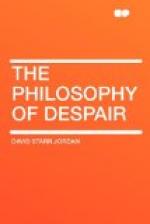If every one did the very best he knew, most of the problems of human life would be already settled. If each one did the best he knew, he would be on the highway to greater knowledge, and therefore still better action. The redemption of the world is waiting only for each man to “lend a hand.”
It does not matter if the greatest thing for you to do be not in itself great. The best preparation for greatness comes in doing faithfully the little things that lie nearest. The nearest is the greatest in most human lives.
Even washing one’s own face may be the greatest present duty. The ascetics of the past, who scorned cleanliness in the search for godliness, became, sometimes, neither clean nor holy. For want of a clean face they lost their souls.
It was Agassiz’s strength that he knew the value of today. Never were such bright skies as arched above him; nowhere else were such charming associates, such budding students, such secrets of nature fresh to his hand. His was the buoyant strength of the man who can look the stars in the face because he does his part in the Universe as well as they do theirs. It is the fresh, unspoiled confidence of the natural man, who finds the world a world of action and joy, and time all too short for the fulness of life which it demands. When Agassiz died, “the best friend that ever student had,” the students of Harvard “laid a wreath of laurel on his bier, and their manly voices sang a requiem, for he had been a student all his life long, and when he died he was younger than any of them.”
Optimism in life is a good working hypothesis, if by optimism we mean the open-eyed faith that force exerted is never lost. Much that calls itself faith is only the blindness of self-satisfaction.
What if there are so many of us in the ranks of humanity? What if the individual be lost in the mass as a pebble cast into the Seven Seas? Would you choose a world so small as to leave room for only you and your satellites? Would you ask for problems of life so tame that even you could grasp them? Would you choose a fibreless Universe to be “remoulded nearer to the heart’s desire,” in place of the wild, tough, virile, man-making environment from which the Attraction of Gravitation lets none of us escape?
It is not that “I come like water and like wind I go.” I am here today, and the moment and the place are real, and my will is itself one of the fates that make and unmake all things. “Every meanest day is the conflux of two eternities,” and in this center of all time and space for the moment it is I that stand. Great is Eternity, but it is made up of time. Could we blot out one day in the midst of time, Eternity could be no more. The feebleness of man has its place within the infinite Omnipotence.
It is a question not of hope or despair, but of truth, not of optimism nor of Pessimism, but of wisdom. Wisdom is knowing what to do next; virtue is doing it. Religion is the heart impulse that turns toward the best and highest course of action. “It was my duty to have loved the highest. What does that demand? What have I to do next? Not in infinity, where we can do nothing, but here, today, the greatest day that ever was, for it alone is mine!




